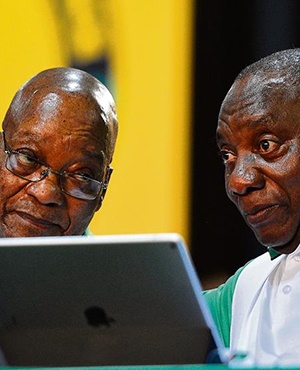How the ANC bungled Zuma's departure
2018-02-12 07:43
President Jacob Zuma and Cyril Ramaphosa. (Themba Makofane)
Multimedia · User Galleries · News in Pictures Send us your pictures · Send us your stories

The only thing worse than a crisis is failure to acknowledge that it exists.
This sums up how the ANC is handling President Jacob Zuma's exit from power. After creating the impression that the party is well positioned to handle the situation internally, it has egg on its face after talks regarding Zuma's departure seemingly deadlocked.
The party's communication on the matter is in shambles; characterised by misinformation, double-talks, and no intention to state the actual state of affairs regarding the talks.
After calling off an NEC meeting that was meant to recall Zuma last week, the party has announced the NEC meeting will be convened to "finalise" the Zuma matter. It is not clear what is meant by finalising Zuma issue. Does it mean the talks have arrived at an agreement and the matter will be communicated to the NEC, from which an announcement will be made? Or, does it mean that the talks failed and the NEC will consider the matter afresh?
The main problem that the ANC is confronted with is the reality that the opposition parties are about to have the Zuma issue dropped in their lap. If the ANC fails to remove Zuma through internal party structures or negotiations, he will face the motion of no confidence in Parliament.
This is a scary picture for the ANC in the sense that the process will be totally out of its control. If Zuma is removed through the motion of no confidence in Parliament, the entire Cabinet would have to go with him. A successful parliamentary motion of no confidence could mean that the budget will not be delivered on February 21 - the date that was confirmed by Parliament - as there will then be a possibility that there won't be a Cabinet in place on February 21.
If Zuma is not removed, I do not think that the EFF will allow for the tabling of the budget with him as the head of the executive. Remember, the budget is the president's budget. It is prepared by the minister of finance on behalf of the president as the head of government.
Zuma knows all this, hence the deadlocks in negotiations. Besides knowing that he is "still loved by the people", President Zuma also knows that he might survive a parliamentary motion of no confidence. Judging by the depth of divisions within the ANC, it is not unthinkable that there are still those who would not want to see him leave office before the end of the term.
Even more concerning for some senior ANC members is the implications of a motion of no confidence on their currently held Cabinet posts. A successful motion will give Ramaphosa a good opportunity to put together a completely new Cabinet, even if that might include some of those who served under Zuma. This ultimately means that within the ANC, there are those who do not want to see a motion of no confidence in Zuma succeeding.
For Ramaphosa, as the new president of the ANC, it is too risky to allow the Zuma matter to be resolved in Parliament through a motion of no confidence; what if the motion does not succeed? That will be interpreted as a rejection of Ramaphosa's vision and it will further embolden the anti-Ramaphosa faction within the ANC. Such a turn of events will also be very embarrassing for the ANC.
- Ralph Mathekga is a Fellow at the SARChI Chair: African Diplomacy and Foreign Policy at the University of Johannesburg and author of When Zuma Goes.
Disclaimer: News24 encourages freedom of speech and the expression of diverse views. The views of columnists published on News24 are therefore their own and do not necessarily represent the views of News24.



























